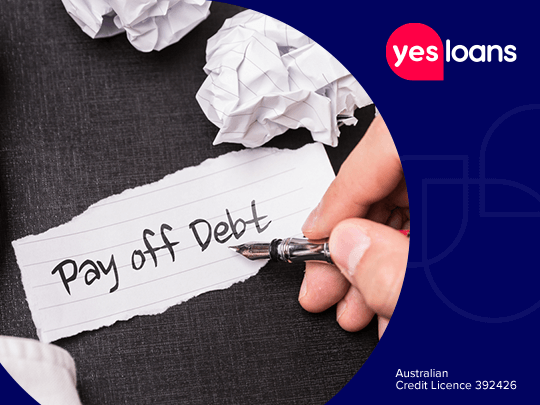Debt Repayment Strategies

Are you stressed about spiraling debt but don’t know how to take control of your finances? With the cost-of-living skyrocketing in Perth, trying to balance your living expenses while juggling multiple repayments can affect your financial and emotional well-being.
Yes Loans are here to let you know that getting on top of your debt is possible. Once you have an honest conversation with yourself about your debt, you can choose a repayment strategy to get things back under control. There are three main strategies you can use to pay down your debt:
- Snowball
- Avalanche
- Consolidation
Read on to learn how you can pay off debt faster and lay the foundation for financial stability.
The most common types of debt in Australia
Did you know that around 75% of Australian households are in debt? Whether you’re using fast finance personal loans to renovate, buy new cars, invest in business, or enjoy overseas holidays, debt levels are rising and it’s easy to spiral out of control. Let’s look at some common debt types.
- Credit cards: while convenient, if you don’t pay off the balance in full each month, you will be charged interest. And credit card interest rates are high.
- Personal loans: the most common reason for taking out a personal loanis to purchase a new car, usually through a car finance broker, followed by money for holidays, housing, and business loans.
- Payday Loans: these are small, short-term loans that are a quick way to get cash when needed. Convenient and fast to secure, they come at a cost: high fees and high-interest rates.
Paying down debt fast: why it’s essential
The faster you pay down your loan, the less interest you pay. With interest rates rising, paying off your fast finance debt as soon as possible is critical.
Understanding your debt
You need to understand your debt to get a handle on it. Start by listing all your debts. While this can be a confronting exercise, remind yourself that you’re taking charge of your money – which is good.
Include:
- buy now, pay later accounts (Afterpay, Zip, Humm, etc.)
- Credit cards
- loan repayments
- unpaid bills
- fines
- any other owed money.
For each debt item, include:
- The balance
- The minimum monthly repayment (if applicable)
- The due date for payment
- The interest rate (if applicable)
This information helps you get a clear picture of which debts you should focus on paying down first.
Interest rates: why they are critical
The critical factor to consider when paying off debt is the interest rate. The higher the rate, the more interest you’ll pay if you miss a repayment. The Money Smart Credit Card Calculator can help you estimate and calculate the time it’ll take to pay down your credit card balance. Once you’ve listed all debts and interest rates, consider the debt payment strategy you’ll use to pay down your debts.
Choose the strategy that best suits your personal situation
- Snowball Method: paying off the smallest debt balance first, regardless of the interest rates. It focuses on paying minimum payments on all debts but allocates extra funds to the smallest debt until it’s fully repaid.
Pay off debt with the Snowball Method:
- List out debts from lowest to highest balance
- Make minimum payments for all debt except the smallest balance
- Pay extra towards the smallest debt
- When you have paid off the smallest debt, start paying extra towards the next smallest balance
- Repeat until all debt is paid off.
Paying off the smallest debt will give you an emotional boost and sense of achievement, keeping your motivation high.
- Avalanche Method: involves paying off debts with the highest interest rates first, regardless of the size.
Pay off debt with the Avalanche Method:
- List out debt from highest interest rate to lowest interest rate
- Make minimum monthly payments on all debt, except for the highest interest rate
- Pay extra towards the debt with the highest interest rate
- Once you have paid off debt with the highest interest rates, start paying more on the next highest interest rate
- Repeat until all debt is paid off.
While this method can save you money in the long run, it may take more work. It also requires discipline and commitment to paying extra for that one debt.
- Debt consolidation: taking out a new loan to pay off multiple debts.
The pros of consolidating debt are:
- Lowering your monthly payments
- Simplifying your finances
- Improving your credit score.
The cons of debt consolidation loans are:
- High fees
- Risk of default
Before consolidating your debts into one larger loan, ensuring you can afford the monthly payments is critical. Because the goal is to prevent you from repeating your repayment pressure, Yes Loans also provides a financial strategy to accompany your debt consolidation loan.
Is your debt out of control?
Here are some signs your debt may be getting out of control. Are you:
- Spending more than you earn each month?
- Carrying a balance on your credit cards each month?
- Making minimum payments on your debts?
- Feeling stressed about your finances?
- Considering declaring bankruptcy?
If you answered yes to any of those, you should act before it spirals.
Consider Yes Loans
Choose to be proactive and take control of your financial health. With our customer-centric approach and commitment to providing reliable financial support, Yes Loans car finance brokers offer a compelling reason for you to choose us.
We tailor a path forward that improves your long-term situation. As a leading Perth loan company, Yes Loans can help you deal with debt in a way that positively affects future financing opportunities.
And, if you’re considering buying a new car, speak to one of our experienced car loan brokers. Reach out to us today for a no-obligation conversation.

